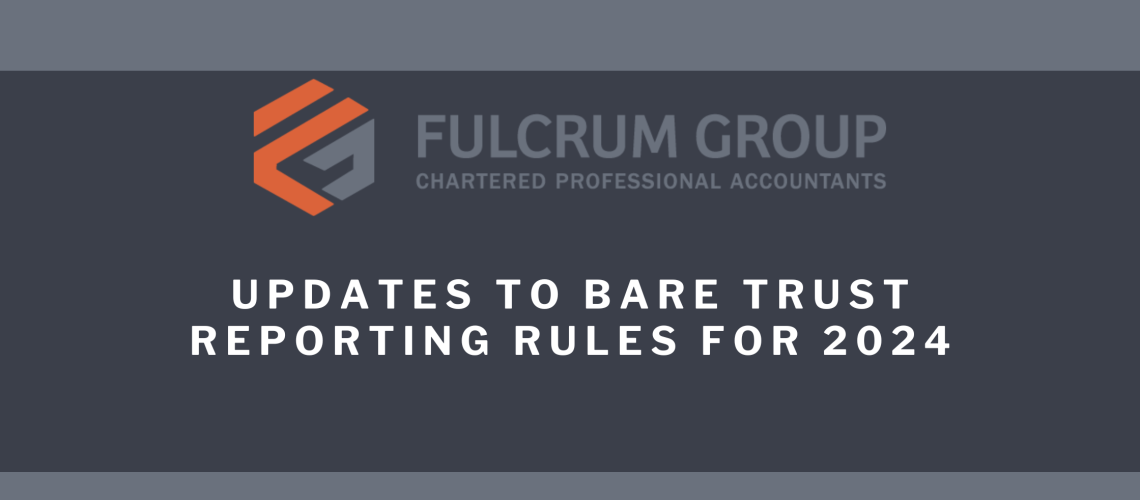The Department of Finance and the Canada Revenue Agency (CRA) have announced that bare trusts will be exempt from filing T3 tax returns including Schedule 15 for 2024, unless the CRA makes a direct request for the filing.
This is welcome news, though some uncertainty remains regarding the specific filing exemptions that will apply in the future.
Proposed Updates to Bare Trust Reporting Rules for 2025
In August 2024, the Canadian government released draft legislation proposing updates to bare trust reporting rules. These changes aim to reduce the number of bare trusts required to file compared to the original legislation. Notably, the draft legislation proposes an expansion of exemptions. Here’s a comparison of the current legislation and the proposed changes:
| Proposed Changes – 2025 | Current Legislation |
| Under the proposed rules, certain arrangements will be labelled “deemed trusts.” This means if one person (the “trustee”) holds property entirely for someone else’s benefit, that arrangement may be treated as a trust for tax purposes.
Once it’s a deemed trust, it generally must file a T3 return and Schedule 15, unless it fits under a specific exemption in the legislation. |
Under current legislation, there is no explicit statutory definition of a bare trust in the Income Tax Act. However, the Canada Revenue Agency (CRA) generally considers a bare trust to exist when:
|
| Exempt if the fair market value (“FMV”) of all assets is $50,000 or less | Exempt if holding less than $50,000 in cash, government debt obligations, and listed securities. |
Exempt if all the following criteria are met:
|
No comparative |
| Exempt if all legal owners of real property are related individuals and the property can be designated as the principal residence of at least one owner.
i.e.: Parents have co-signed their adult children’s mortgage for financing purposes. |
No comparative |
(*FMV: Fair Market Value)
Common “Deemed Trust” Exemption Situations
These proposed changes could provide significant relief for certain common arrangements as no T3 Return and Schedule 15 would have to be filed, including:
- Co-signing Arrangements: Most co-signing arrangements for mortgages and estate planning could be exempt from filing requirements.
- Child on Title Scenarios: Cases, where a child is listed on title for a parent’s bank accounts and investments (under $250,000), might also qualify for exemptions.
- Joint Ownership for Bank Accounts or Other Property: When property is held jointly (e.g., a joint bank account) by individuals who all share in its use or benefit.
- Spouses and Principal Residence: When spouses (or common-law partners) jointly occupy a family home, but only one spouse is on title, and the property could be designated as that spouse’s principal residence.
- Partnerships: When property is held for the use or benefit of a partnership, and each legal owner is a general partner (not a limited partner), and the partnership files its own information return.
- Court Order: When someone holds property solely because of a court order (e.g., as part of a legal settlement).
- Non-Profit Organizations (NPOs) Holding Government Funds: When property (funds) is exclusively held by an NPO or a charity that has received these funds from the federal or provincial government for the use or benefit of other qualifying NPOs or charities.
Other Exemptions
Below are new scenarios in which a trust would not have to file Schedule 15, and in some cases, would not need to file a T3 return:
- Trusts Created to Meet a Legal Requirement
- A trust established specifically to comply with a Canadian or provincial law (e.g., a legal requirement for a particular purpose).
- Lawyer’s Separate Trust Account
- A lawyer’s separate trust account, provided its assets do not exceed $250,000 in the year.
- (Note: A lawyer’s general trust account continues to be exempt without any dollar limit.)
Looking Ahead
While the 2024 filing exemptions offer some breathing room, many trusts active in 2025 will still have filing obligations due by March 31, 2026. This deadline will approach quickly, so it’s crucial to stay informed and prepared.
Follow us for updates as the situation evolves.

